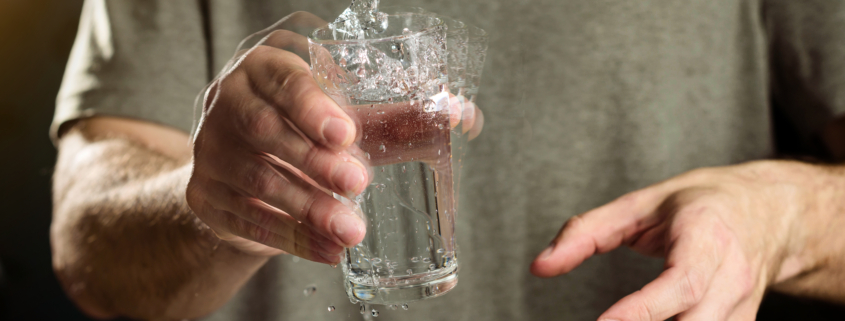Alcohol Abuse Shaking Hands
Table of Contents
One of the common signs of alcohol use disorder is shaking hands, also referred to as the alcohol shakes. These hand tremors are the body telling you that alcohol abuse is occurring, or that alcohol dependency has taken hold. To learn more about alcohol abuse shaking hands, and all alcohol withdrawal symptoms, read on.
What are the Alcohol Shakes?
Shaking hands, or tremors, are one of the common signs of alcohol withdrawal. These alcohol shakes emerge as a symptom of alcohol withdrawal. Someone with a long history of alcoholism may have not only shaking hands, but whole body tremors. For someone involved in alcohol abuse, shaking hands is a sign they have alcohol use disorder.
How Does Alcohol Abuse Cause Hand Tremors?
Alcohol is a central nervous system depressant, which means it slows nerve activity in the brain and nervous system. Alcohol abuse can also cause inflammation in the central nervous system.
When the depressant effects of alcohol wear off, the nervous system speeds up again. These hyperactive neurons are what can cause the shaking hands. When an alcoholic quits drinking, they will experience these alcohol shakes during the detox and withdrawal process.
Alcohol withdrawal should never be attempted without medical supervision. During alcohol withdrawal, a serious, even life-threatening health event called the delirium tremens can emerge unexpectedly. Being under the care of a medical detox team is the recommended course of action when you decide to quit alcohol.
What are the Signs of Alcohol Abuse and Dependence?
If you have experienced alcohol abuse shaking hands, it is a wake up call. Binge drinkers who abuse alcohol may get alcohol shakes when the alcohol wears off. But shaking hands can also be a sign of withdrawal, a signal that your brain has gotten used to alcohol. Once the brain is dependent on the presence of alcohol, the withdrawal symptoms emerge.
Signs and symptoms of alcohol dependency or addiction include:
- Drinking more and for a longer period than planned
- Increased tolerance for alcohol, leading to higher consumption
- Having blackouts
- Alcohol cravings
- Centering your life on obtaining alcohol, drinking alcohol, and recovering from hangovers
- Losing interest in social activities in preference to drinking alone
- Attempting to quit or cut back on alcohol and unable to do so
- Withdrawing from friends and family
- Neglecting responsibilities at home, school, or work
- Continuing to drink, despite adverse effects
- Withdrawal symptoms emerge when alcohol wears off or is withheld
How Severe Is My Alcohol Abuse?
A doctor can gauge how severe a person’s alcohol abuse is in several ways. Blood test results may reveal liver counts that are out of range, which is a red flag. These markers indicate that something, such as alcohol, is causing damage to the liver.
There are alcohol assessments that can stage your alcohol use disorder based on the number of symptoms you are experiencing. The above list of the signs of alcohol abuse is used to determine severity. If the person has six or more of these signs and symptoms, the alcohol use disorder is staged as severe.
Shaking Hands and Other Alcohol Withdrawal Signs
Once you decide to quit drinking and begin the recovery process, the brain will respond to the absence of alcohol. Once the withdrawal symptoms surface, it takes several days for your system to adjust and stabilize. On average, symptoms of alcohol withdrawal begin within twelve hours.
Symptoms range from mild to severe, depending on the severity of the alcohol use disorder:
Mild Withdrawal Symptoms
- Nausea and vomiting
- Sweating
- Fever
- Headache
- Anxiety
- Agitation
- Hand tremors
- Muscle weakness
- Insomnia
Moderate Withdrawal Symptoms
- Disorientation
- High blood pressure
- Intense fatigue
- Mood swings
- Shaking
- Mild seizures
- Severe confusion
Severe Withdrawal Symptoms
- Hallucinations
- Suicidal thoughts
- Seizures
- Delirium tremens (DTs)
What Happens in Alcohol Detox and Withdrawal?
Alcohol detox lasts about 5-10 days. While symptoms will vary, the detox and withdrawal unfolds in three stages:
Stage 1: Symptoms start 6-12 hours after the last drink. During this stage, common symptoms include fatigue, heart palpitations, anxiety, nausea and vomiting, shaking hands, agitation, and foggy thinking.
Stage 2: This stage occurs on days 1-3 days. During this stage, symptoms are more intense and will peak. They may include irregular heart rate, mental confusion, profuse sweating, irritability, insomnia, moodiness, increased blood pressure, and fever.
Stage 3: The final stage occurs on day 3-7. During this stage many of the symptoms will begin to fade and resolve. However, on days 3-4 there is risk of the sudden onset of the DTs.
How to Get Help for Alcohol Abuse and Alcoholism
During the treatment phase of recovery, you will engage in a variety of treatment activities and therapies. These work in various ways to help you overcome the addictive behaviors. These include:
- Therapy. Psychotherapy helps by examining underlying emotional issues or past traumas that may be a contributing factor. Cognitive behavioral therapy (CBT) guides individuals toward adopting new thought and behavior patterns that replace the disordered patterns that have culminated in alcohol abuse.
- Group therapy. These small group meetings allow you to share with others in recovery, which can become an essential source of peer support.
- Family therapy. Family-based therapy helps family members process their frustrations, hurt feelings, and fears around how the disease of alcoholism has impacted them.
- Medication. There are medications that can help manage cravings and reduce relapse.
- Relapse prevention. You’ll make a relapse prevention plan to anticipate the triggers and stressors that might disrupt recovery and lead to relapse.
- 12-step facilitation. Recovery programs like A.A. and SMART Recovery provide extra guidance and structure to the recovery process.
- Holistic. Holistic methods like yoga, art and music therapy, and meditation massage can enhance clinical effects and also reduce stress.
- Wellness. Nutritional counseling and exercise are incorporated into the program to restore health and wellness.
Annandale Behavioral Health Offers Comprehensive Treatment for Alcoholism
Annandale Behavioral Health provides a multi-disciplinary approach in the treatment of alcohol use disorder. If you are engaged in alcohol abuse, shaking hands is a sign that you need professional support. To learn more about our evidence-based treatment program, please reach out to us today at (855) 778-8668.







